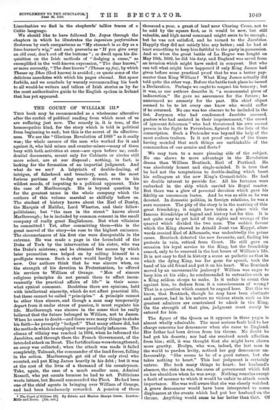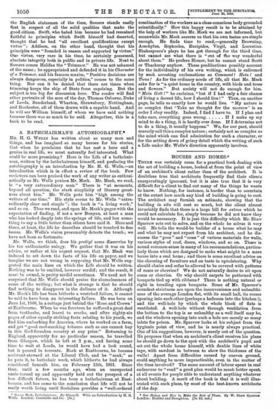1.1-11/ COURT OF WILLIAM III.'
Tun book may be recommended as a wholesome alterative after the surfeit of political reading from which most of us are suffering just now. The remedy is, it is true, of the homoeopathic kind, for the story which is told is political from beginning to end; but this is the secret of its effective- ness. We see the " Glorious Revolution of 1688 " as it really was ; the whole careers of the men who worked for it and against it, who laid mines and counter-mines—many of them busy with both activities at once—are open before us ; confi- dential documents, meant only for Cabinets or circles still more select, are at our disposal ; nothing, in fact, is lacking for the formation of an impartial judgment. And
what do we see A labyrinth of double-dealing, of intrigue, of falsehood and treachery, such as the most furious partisan of to-day never dreams, even in his wildest moods, of imputing to a political opponent. Take the case of Marlborough. His is beyond question by far the greatest name in the whole company which the authors of this volume marshal so skilfully before us. The student of history knows about the Earl of Denby, the Marquis of Halifax, Lord Wharton, and their fellow- politicians; but "the man in the street" knows about Marlborough ; he is included by common consent in the small company of really great Englishmen. But what villainies he committed I Yet, after committing them—this is the great marvel of the story—he rose to the highest eminence. The circumstances of his first rise were disreputable in the extreme. He was made a page in the household of the Duke of York by the intervention of his sister, who was the Duke's mistress; and he obtained the means by which later promotion was helped on by selling himself to a profligate woman. Such a start would hardly help a man now. Our authors think that he was sincere when, on the strength of his devotion to Protestantism, he offered his services to William of Orange. " Men of sincere religious principles do not permit them to affect incon- veniently the practical affairs of life " is their some- what cynical comment. Doubtless there are opinions, held with intellectual sincerity, which do not affect practical life, but these cannot be called " principles." A principle cannot be other than sincere, and though a man may temporarily depart from it under stress of passion, it must regulate his life. Marlborough was sincere in the sense that he really believed that the future belonged to William, not to James. When he came to doubt—and there were many things to shake his faith—he promptly "hedged." That many others did, but the methods which he employed were peculiarly infamous. The climax of villainy was reached in 1694, when he informed the Jacobites, and through them the French Government, of the intended attack on Brest. The fortifications were strengthened; an army was collected ; when the attack was made it failed completely, Talmash, the commander of the land forces, falling in the action. Marlborough got rid of the only rival who counted, and put King James heavily in his debt ; but it was at the cost of the lives of a thousand of his countrymen. Take, again, the case of a, much smaller man, Admiral Russell, who yet counts because he had to act. Politicians wrote letters, but Russell commanded the Fleet. He had been one of the chief agents in bringing over William of Orange, and had been handsomely rewarded. A pension of three * The Court of William, III. By Edwin and Marion Sharpe Grew. London : Mills and Boon. [15s. net.] thousand a year, a grant of land near Charing Cross, not to be sold by the square foot, as it would be now, but still valuable, and high naval command might seem to be enough ; but he was not satisfied, and he turned to the Jacobites. Happily they did not satisfy him any better ; and he had at least something to keep him faithful to the party in possession. And so when the great battle of La Hogue was fought on May 19th, 1692, he did his duty, and England was saved from an invasion which might have ended in conquest. But who can tell what might have happened if only King James had given before some practical proof that he was a better pay- master than King William ? What King James actually did told quite the other way. Before the battle took place he issued a Declaration. Perhaps we ought to respect his honesty ; but it was, as our authors describe it, " a monumental piece of indiscretion." He gave no assurances for the future ; he announced no amnesty for the past. His chief object seemed to be to let every one know who would suffer if he returned. No one was too obscure to be included in the list. Jurymen who had condemned Jacobite accused, gaolers who had assisted in their imprisonment, " the crowd of ignorant fishermen" who had threatened his own sacred person in the flight to Faversham, figured in the lists of the conscription. Such a Pretender was beyond the help of the most zealous traitors. Is it not proof enough of the times having mended that such things are unthinkable of the commanders of our armies and fleets ?
We may turn to a more pleasing side of the subject. No one shows to more advantage in the Revolution drama than William Bentinck, Earl of Portland. He was absolutely honest and single-minded. It is true that he had not the temptations to double-dealing which beset his colleagues at the new King's Council-table. He had no double interest to provide for. All his fortunes were embarked in the ship which carried his Royal master. But there was a glow of personal devotion which gave his fidelity an uncommon lustre. And he was as able as he was devoted. In domestic politics, in foreign relations, he was a sure resource. The pity of the story is in the marring of this great friendship; it might have taken a place with the famous friendships of legend and history but for this. It is not quite easy to get hold of the rights and wrongs of the quarrel which divided the two men. The sudden favour which the King showed to Arnold Joost van Keppel, after- wards created Earl of Albemarle, was undoubtedly the prime cause. Bentinck detested the new favourite, and, finding his protests in vain, retired from Court. He still gave on occasion his loyal service to the King, but the friendship ceased, only to be renewed in the last hours of William's life. It is not easy to find in history a scene so pathetic as that in which the dying King, too far gone for speech, took the hand of his old friend and put it on his heart. Was Bentinck moved by an unreasonable jealousy ? William was eager to keep him at his side ; he condescended to entreaties such as a King seldom stoops to make. Is it unfair to count this against him, to deduce from it a consciousness of wrong ? That is a question which cannot be argued here. But this we know, that Bentinck, though he may have been obstinate and narrow, had in his nature no vicious strain such as his greatest admirers are constrained to admit in the King. On the strength of that plea, judgment must surely be entered for him.
The figure of the Queen as it appears in these pages is almost wholly admirable. The most serious fault laid to her charge concerns her demeanour when she came to England. Her father had been driven from his throne. No doubt ho had got his deserts ; nor had she received much affection from him ; still, it was thought that she might have shown more gravity. Evelyn, who was, indeed, the last man in the world to pardon levity, noticed her gay demeanour un- favourably. " She seems to be of a good nature, but she takes nothing to heart." This last judgment is certainly untrue. She took many things to heart her husband's absence, the risks he ran, the cares of government which fell on her shoulders when he was away. Nothing remains except a fault of manner to which it would be unfair to attach much importance. She was well aware that she was closely watched. A grave demeanour would have been interpreted to mean displeasure at the events which had put her husband on the throne. Anything would seem to her better than that. Of
the English statesmen of the time, Somers stands easily first in respect of all the solid qualities that make the good citizen. Swift, who hated him because he had remained faithful to principles which Swift himself had deserted, thought that he had "all excellent qualifications except virtue " ; Addison, on the other hand, thought that his principles were "founded in reason and supported by virtue." One virtue, very rare in his time, he certainly possessed, absolute integrity both in public and in private life. Neat to Somers comes Halifax the " Trimmer." He was not ashamed of the name ; he appropriated and defended it in his Character of a Trimmer, and his famous maxim, "Positive decisions are always dangerous, especially in politics," comes to the same thing. Nor can it be denied that there are times when trimming keeps the ship of State from capsizing. But the subject is too big for discussion here. The reader will find other portraits of the men of the day, Thomas Osborne, Duke of Leeds, Sunderland, Wharton, Shrewsbury, Nottingham, and Rochester, all of them drawn with a capable hand. And he will see William himself, of whom we have said nothing because there was so much to be said. Altogether, this is a book to be read.























































 Previous page
Previous page